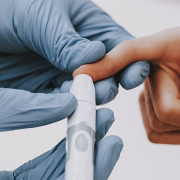How hearing patient experiences levels up genomics training
Incorporating patient voices in genomics education can help healthcare professionals see the human impact of genomics. Here are some examples from our own work
The ‘patient voice’ is of course vital to ensuring that our education and training for healthcare professionals is fit for purpose. As educators, we listen to patients so that we can design education for the NHS workforce in a way that, ultimately, better meets patients’ needs.
But there are benefits to the learner too. By listening to and learning from patients’ experiences, healthcare professionals can, for example, learn how patients want to be spoken to and the language they prefer to be used when discussing a genomic test. It can also highlight areas in which patients may need support during genomic testing, such as with their mental wellbeing.
In the National Genomics Education programme, patient voices are woven through all our courses, resources and tools. Here, are some of our educational projects that have notably benefitted from respecting the patient voice.
Patient voices in films
We have produced a number of patient-centred videos that connect a genomic technology to the patient through the narrative of lived experience. These videos are an important tool in that they give learners a chance to reflect on the human impact of genomics.
In our film ‘The power of a genetic diagnosis’, Beskida talks about her son, his diagnosis and how her family could plan his support and possible support for future children. This family was only able to do this thanks to the advancements in genomic technologies. Direct and accessible videos like this help healthcare professionals understand how and why genomic tests impact on patient lives.
Patient voices in raising awareness
The #GenomicsConversation is an annual week-long event to raise awareness of genomics among the NHS workforce. In 2023 we dedicated a day to patient experiences and perspectives on their journey to – and the consequences of – uncovering a genomic cause of disease.
One particularly impactful story from Arti Patel highlighted the patient voice in self-advocacy. Arti received the Treacher-Collins syndrome diagnosis at birth. Because of the diagnosis, Arti effectively self-advocated for genomic testing with her local genetics department, even though her GP’s office had deemed testing as not clinically necessary. Genomic testing helped Arti understand her rare disease better, and how it may affect her future family.
Her full story, which can be read in our blog, highlights that some clinicians have gaps in their knowledge when it comes to rare disease. For medical professionals who take the time to learn about genomics, rare disease and listen to a patient, the outcomes can be life altering.
Patient voices in online courses
As genomics enters more diagnostic clinical pathways, our online courses help clinicians understand how to access both tests for rare disease and solid tumour cancers. These courses let learners hear from a wide range of people, from genomics specialists to patients, to help them understand the importance of genomic testing.
We hear how one person’s diagnosis affected the whole family through Debbie and her daughter Emma’s story. They candidly explain their feelings, as well as how Emma and her brothers – who are at risk for having inherited the same disease-causing variant – have reacted differently to the diagnosis. This real-life story shows learners how genomic test results can extend beyond the patient to their wider family.
Patient voices in events
Last year, an international group of genomic education professionals and advocates came together to discuss how genomics education can be better supported globally. Among them was Jillian Hastings-Ward from Genomics England’s Participant Panel.
Jillian’s presentation of her own experiences and her work in patient advocacy gave the international delegates a unique perspective on how a patient’s journey can be used to feed back into modern medical systems and education.
Making room for patient voices
Among the technological and medical advancements quickly coming out of genomic technologies, it is the patient voice that places a human-centric view on them. To this end, we established the Patient Advisors for Genomics Education (PAGE) Group. The PAGE Group is who we turn to when seeking patients’ input and viewpoints.
The group is currently open to new members. If you or a loved one has experience of cancer or rare disease and, through this, have been through genomic testing, your experiences can help us shape how we develop genomics education for doctors, nurses and the wider NHS healthcare workforce.









